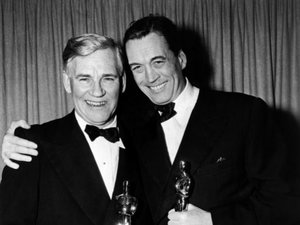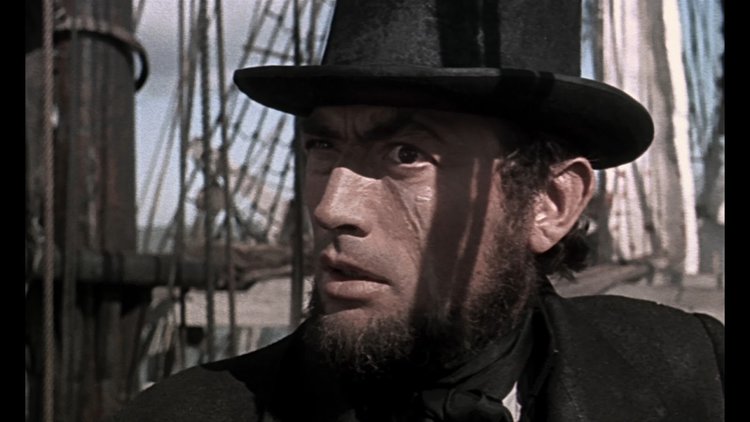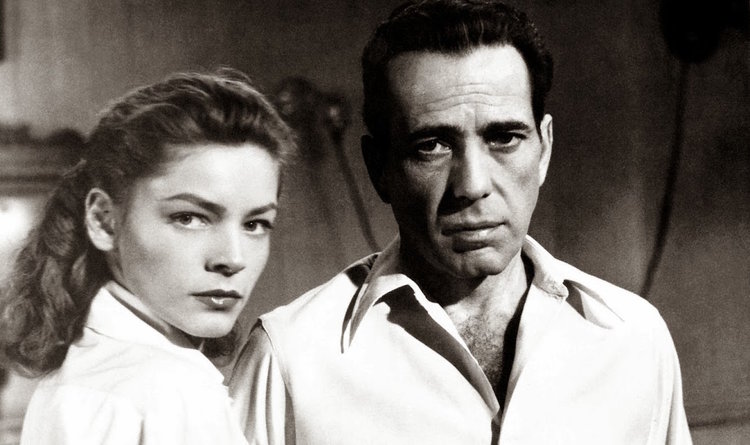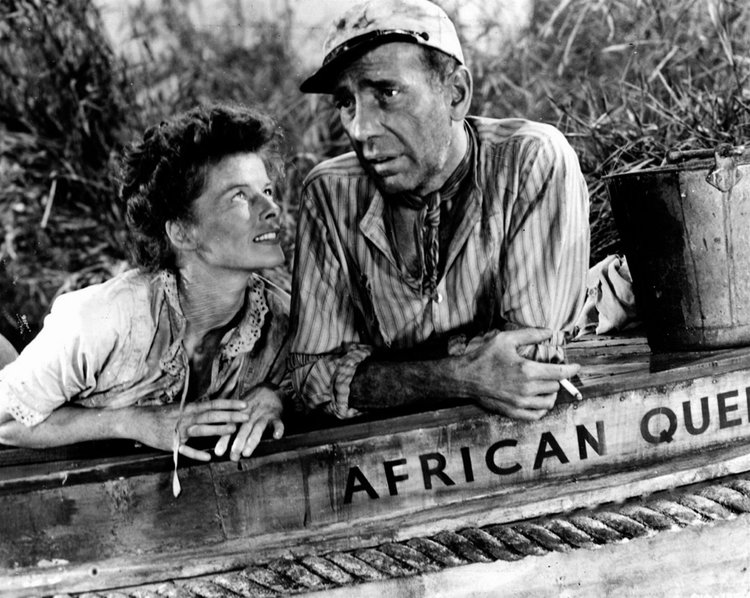I wrote this blog for Night Owl TV and it first appeared on their site on January 10, 2018. A link to that post and other Night Owl TV material can be found here.
John Huston was one of the most important and greatest directors of the 20th Century. A two-time Oscar winner and 12-time nominee, Huston directed several of the most recognizable films in the history of cinema. Those opening sentences may seem hyperbolic, but only until you take a closer examination of Huston’s body of work. This was a man who felt comfortable in any genre and made great films. He was equally adept at the western (The Treasure of the Sierra Madre, The Unforgiven), Film Noir (The Maltese Falcon, The Asphalt Jungle), adventure (Moby Dick, The Man Who Would be King), straight drama (The African Queen, Prizzi’s Honor), and even the family musical (Annie).

John Huston (right) with his father, Walter Huston taking Oscars for their work in The Treasure of the Sierra Madre (1948). John for Best Director and Best Writing Adapted Screenplay, and Walter for Best Supporting Actor.
Huston worked with many of the biggest stars in the history of Hollywood, but it was his partnership with Humphrey Bogart where he did his best and most iconic work. Iconic is probably the word that best describes much of the work that Huston did. He directed more than 40 films, and picking out his best films is like an exercise in naming some of the greatest films ever made.
With that in mind, let’s take a closer look at seven films directed by the great John Huston that are counted among his best.
7. The Man Who Would be King (1975)

Starring Sean Connery, Michael Caine and Christopher Plummer, this cinematic adventure (based on the story by Rudyard Kipling) is a great example of a story being driven by flawed heroes who we still can’t help but root for. He achieved this by making former British soldiers Carnehan (Caine) and Dravot (Connery) sympathetic. They’ve become thieves and scoundrels, but were once honorable men who felt slighted and betrayed by the nation that they fought and bled for. This betrayal is what motivates them to do the less-than-ethical things they do, and that ultimately leads to their downfall. However, their honor never fully leaves them, and ultimately, they do find a measure of redemption.
6. Moby Dick (1956)

Starring Gregory Peck and based on the classic novel by Herman Melville, with Moby Dick we again have a flawed character, but this one isn’t the hero. Captain Ahab is one of Peck’s signature roles, which is certainly saying something for an actor with such an arsenal of distinguished roles in so many great films. Of course, the character was created by Melville, but Huston and Peck were masterful in conveying the obsession that Ahab had with killing the great white whale; and how that obsession led not only to his own downfall, but to the destruction of everyone and everything around him. The story of Moby Dick has become symbolic of unattainable goals that people set for themselves which end up being detrimental to their own personal well-being. The movie itself is tense and entertaining thanks to Huston’s direction of giving Melville’s century-plus-old novel a contemporary feel.
5. Key Largo (1948)

Huston assembled some serious star power for this film. Starring Humphrey Bogart, Lauren Bacall, Edward G. Robinson, and Lionel Barrymore, this is a tense and suspenseful gangster story with the added component of adventure in the form of an impending hurricane, just to make things a little more interesting. This is also a film that goes a bit against type for Huston in that the hero goes from passive to heroic and grows throughout the story rather than regressing. Bogart is the hero of the story, starring as Frank McCloud, a WWII veteran who travels to the Key Largo home of one of his fallen comrades. While bonding with his friend’s widow Nora (Bacall) and wheelchair-bound father James (Barrymore), a group of gangsters show up lead by Johnny Rocco (Robinson), and hold them hostage. At first disillusioned by the violence he just left behind in WWII, McCloud is hesitant to confront Rocco and his gang. But as the story progresses and he sees the wickedness in Rocco and learns more of the evil he’s done, the hero inside him comes out and he saves the day. Huston took a hard look at passivism vs. action in this story and created in McCloud a truly conflicted character that made for a very dramatic adventure story.
4. The Asphalt Jungle (1950)

One of the great and most recognizable Film Noir, this is a heist movie in which the heist goes as planned, but double-crosses and bad luck cause the getaway to unravel. Starring Sterling Hayden, the unraveling of the plan was a common motif in Huston’s film. We as the audience watch the plan go awry and feel it falling apart, but we still hope against hope that the perpetrators can get away with it. Also like many of Huston’s films, the protagonists of this film are anti-heroes that we shouldn’t be rooting for, but are compelled to all the same by Huston’s brilliant direction and story-telling. This gritty, uncompromising film is definitely required viewing for any Film Noir fan.
3. The African Queen (1951)

Huston teamed up with Bogart again, along with the added ingredient of Katherine Hepburn to create an adventure/drama/romance about a roguish drunkard giving a ride on his boat to a prudish old maid down the Congo River to escape from WWI Colonial Germans. The beauty in the conflict of this picture is that it’s between the two main characters who need to be allies. The brilliance in the story is how both characters, who start out as opposite extremes, come together not only, for their very survival but to love each other. The adventure combines with the romance to make the drama, and this is one of the deepest and most riveting films in Huston’s pantheon.
2. The Maltese Falcon (1941)

Many experts refer to this film as one of the greatest, if not the greatest Film Noir of all time. What makes that even more remarkable is that it was Huston’s directorial debut. Humphrey Bogart stars as Sam Spade, a private detective who becomes embroiled in a sinister plot with eccentric criminals involving the search for a priceless artifact. After his partner is killed, Spade needs to outwit crooked cops, black marketers and a stunning femme fatale to keep his P.I. license, keep out of jail, and keep him from getting killed. This film may not have had the thoughtful gravitas and thematic issues of later Huston classics, but it’s an intricately woven crime story that keeps the audience guessing while being delightfully entertaining. It also boasts another all-star cast with Peter Lorre, Sydney Greenstreet and Mary Astor as the femme fatale Bridget who weaves the web of deceit that pushes the story forward.
1. The Treasure of the Sierra Madre (1948)

Yet another partnership between Huston and Bogart, this film tops them all. Nominated for Best Picture, this film won Huston his two Oscars (Best Director and Best Writing Adapted Screenplay). This masterpiece of a film encapsulates Huston’s best motifs to a tee. We have a main character in Fred Dobbs (Bogart) who is an expatriated American out of money and down on his luck in Tampico, Mexico. He and his friend Curtin (Tim Holt) hear about the legend of millions of dollars in gold buried in the Sierra Madre Mountains from an old codger, played by Walter Huston (John Huston’s father). Together they go looking for riches. Dobbs starts out the film as a flawed but sympathetic character who exhibits honor and integrity. Greed and paranoia slowly take over as the three prospectors discover more and more gold, ultimately leading to Dobbs’ ruin. The Treasure of the Sierra Madre is one of cinema’s best examples of the story’s hero devolving and ending up as the villain. It’s wonderful storytelling and is a warning against greed. The film shows that true happiness doesn’t come from vast wealth and the hunt for wealth can often lead in the opposite direction.
These films are all great and special in their own way and I didn’t even include other Huston classics like Night of the Iguana, Prizzi’s Honor or The Red Badge of Courage. What makes Huston’s films so great? There are a lot of things to talk about in this regard, but one thing that Huston did very well was to create stories with flawed characters who had flawed intentions. He also wasn’t afraid to allow the stories to go very wrong for these flawed heroes. You can call that cynical filmmaking or you can call it honest filmmaking, but one thing that it always turned out to be was compelling and entertaining filmmaking.